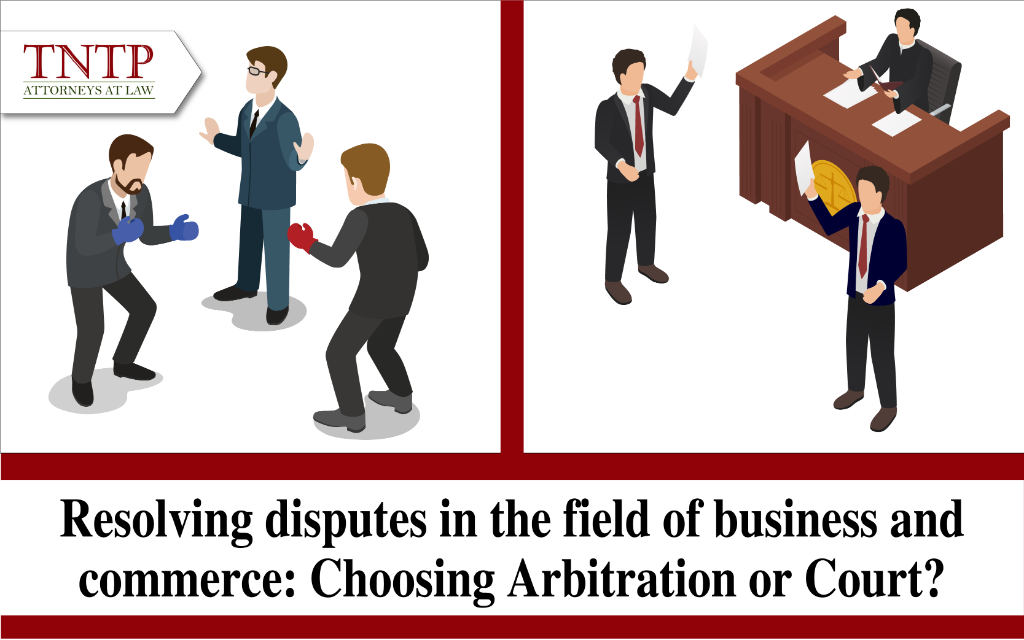Resolving disputes in the field of business and commerce: Choosing Arbitration or Court?

In recent years, disputes in the line of business and commerce have been increasing. To minimize damage, the parties shall choose a dispute resolution suitable to their business and production situation. Accordingly, when a dispute occurs, the parties can choose the following resolution methods: Negotiation, conciliation, arbitration, or court. In case negotiation or conciliation is unsuccessful, the parties will have to consider resolving the dispute at an arbitration agency such as Arbitration or Court. In this article, TNTP will present some characteristics of these two methods so that the parties have more basis to choose the appropriate dispute resolution.
1. Dispute resolution in Court
Firstly, in nature, resolving disputes by the Court is through the operation of the judicial apparatus and on behalf of state power to issue judgments or decisions that force the parties to carry out their obligations, even by physical force. When a dispute occurs, one of the parties can sue in court to protect their legitimate rights and interests. However, before submitting a lawsuit in Court, the plaintiff needs to determine whether the Court has jurisdiction and whether the parties have an arbitration agreement or not. In case the parties have an arbitration agreement but still sue a lawsuit in Court, the Court will refuse to accept the case, unless the arbitration agreement is invalid or the arbitration agreement cannot be performed.
Secondly, dispute resolution by the Court shall follow the two-level adjudication regime (first instance, appeal,…). Accordingly, in case of disagreement with the judgment or decision of the first instance, each party has the right to appeal within the prescribed time limit
Thirdly, dispute resolution in Court must be carried out according to the principle of public trial. In special cases where it is necessary to keep State secrets, preserve the nation’s fine customs and practices, protect minors, or keep professional secrets, business secrets, and personal secrets of the involved parties at their legitimate claims, the Courts may conduct the trials behind closed doors (Article 15 of the Civil Procedure Code 2015).
2. Dispute resolution at Arbitration
Firstly, the Arbitration method allows parties to resolve disputes quickly, simply, conveniently, and in accordance with the psychology of businesses. However, Arbitration fees are often higher than court fees. In the case of reimbursement of arbitration fees, depending on the regulations of each Arbitration Center, the reimbursement fee may not be equal to the Court’s refund fee.
Secondly, the disputing parties have the right to choose an arbitration body. If initiating a lawsuit in Court, the plaintiff must submit a lawsuit at a Court with jurisdiction according to the provisions of the Civil Procedure Code 2015. For cases resolved in Arbitration, the parties can agree to any arbitration centre or arbitrator to resolve the dispute. For instance: The disputing parties all have their business headquarters in Hanoi city, so to facilitate dispute resolution, the parties agreed to choose an arbitration centre in Hanoi city to resolve the dispute.
Thirdly, regarding information confidentiality: Dispute resolution by Arbitration is carried out on the principle of non-publicity unless the parties agree otherwise. Therefore, a closed trial at Arbitration can minimize negative effects on the reputation and business activities of the disputing parties.
Fourthly, the trial at Commercial Arbitration only takes place at one level of trial, the arbitration award is final and binding on the parties. Thus, resolving disputes by Arbitration will save time and money for the parties as they do not have to continue resolving the dispute at the appellate level like in Court. However, the arbitration award can be annulled according to cassation procedures.
With the contents analyzed above, depending on the production and business situation, the parties should choose the method of dispute resolution by Court or Arbitration when there is a dispute in the field of business and commerce. However, the parties need to pay special attention and remember that the prerequisite for resolving disputes by commercial arbitration is that the parties must have an arbitration agreement, and must ensure that this agreement is legally valid and can be done.
Above is the content of the article “Resolving disputes in the field of business and commerce: Choosing Arbitration or Court?”. Hope the above article is useful for those interested in this issue.
Best regards,



